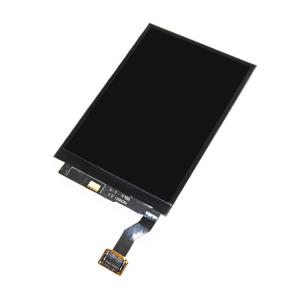
Add to Cart
ESHX258RNN10A is 2.58 inch AMOLED Display Module , 240x320 Resolution, 20 pins MPU Interface, brightness 300 cd/M2 lcd oled display, oled IC is S6E63D6X
A: Product Parameter
| Part NO. | ESHX258RNN10A | ||
| Display Technology | AMOLED | ||
| Diagonal Screen Size | 2.58 inch OLED | ||
| Resolution | 240x320 | ||
| Viewing Angle | all | ||
| Operation Temperature | -20 ~ +70 ℃ | ||
| Active Area (mm) | 39.6X52.48mm | ||
| Panel size(mm) | 43.38X60.7X0.92mm | ||
| Brightness(cd/m2) | 300 cd/M2 | ||
| Interface | MPU | ||
| Pin q'ty | 20 pins | ||
| Contrast Ratio | 10000:1 | ||
| driving IC | S6E63D6X | ||
| touch panel | / | ||
B:Product Picture



C:Drawing &Pin definition


D: Oled Product Knowledge
OLED Advantages:
OLED sets are lighter and thinner than LCDs , high contrast, high color saturation, lower consumption
OLED Disadvantages
AMOLED is extremely expensive than LCD and TFT, lifetime is shorter than LCD and TFT
E: Company Information
Huaxin Advantage:
1. factory base located at inland city which has cost effective
2. most advanced new equipment which can keep quality stable
3. most processes using fully automatic equipment which has effeciency and stable quality
4. professional engineers and production leaders who works in lcd field for more than 20 years
5. self design for customized product
our certificates
1.ISO14001/
2.ISO9001/IATF16949
3.SGS of LCD module
F: Production Capacity
| Annual Production Capacity | 2021 (Current) | 2022 (Goal) | 2023 (Challenge) | 2024 (Challenge) | 2025 (Challenge) | Remark | ||
| LCD Producton Capacity | 4.5 | 9 | 9 | 9 | 9 | Unit:thousands of logarithms/Day | ||
| LCM Producton Capacity | 70 | 150 | 300 | 450 | 450 | Unit:Thousand piece/Day | ||
| Backlight Producton Capacity | 100 | 200 | 300 | 500 | 500 | Unit:Thousand piece/Day | ||
| OLED Producton Capacity | 10 | 20 | 30 | 40 | 50 | Unit:Thousand piece/Day | ||
G: Product Application
1.safety box &instrument
2.lock&smart home
3.transmitter&watch
4.watch&adio
5.collimator&navigator
H: AMOLED Display Characteristics
1.Self-E missive Pixels:
2.Contrast Ratio:
3.Color Accuracy and Vibrancy:
4.Viewing Angles:
5.Power Efficiency:
6.Thinness and Flexibility:
7.Response Time:
I:How does the power efficiency of AMOLED displays compare to other display technologies?
1.Power Consumption:
2.Content Dependency:
3.Brightness Control:
4.Display Size